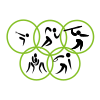Iccus of Taranto
Iccus of Taranto (
Magna Grecia Olympic athlete, a victor during the 84th Games (444 BC)[1] or 70th Games (470 BC) according to older sources.[2] He is considered the father of athletic dietology. He prepared himself physically before competing according to ethical-religious Pythagorean concepts by abstaining from sexual intercourse and a frugal diet specially prepared. He also taught these principles.[3] Pausanias calls him the best gymnast of his age,[4] and Plato also mentions him with great praise.[5]
Iamblichus calls him a Pythagorean.[6][failed verification] According to Themistius,[7] Plato reckoned him among the sophists. Specifically, in Plato's dialogue Protagoras, the sophist Protagoras lists Iccus alongside Homer, Hesiod, Simonides, Orpheus, Musaeus, Herodicus, Agathocles tutor of Damon, and Pythoclides as fellow sophists (that is, improvers of youth) who chose to present themselves as poets, athletes, or musicians for fear of public disapproval.[8]
References
- ISBN 978-88-97805-32-8.
- ^ "Iccus - A Dictionary of Greek and Roman biography and mythology - William Smith, Ed". www.perseus.tufts.edu. Retrieved 2016-06-05.
- ISSN 0394-9001
- ^ Pausanias, vi. 10. §5-6
- ^ Plato, de Leg. viii. p. 840, Protag. p. 316, with the Scholium; comp. Lucian, Quomodo Hist, sit conscrib. 35; Aelian, Varia Historia xi. 3
- ^ Iamblichus. De Vita Pythagorica. p. 36.
- ^ Themistius, Orationes xxiii.
- ^ Plato. Martin Ostwald; Gregory Vlastos (eds.). Protagoras (PDF). Translated by Benjamin Jowett. p. 316d–316e.

